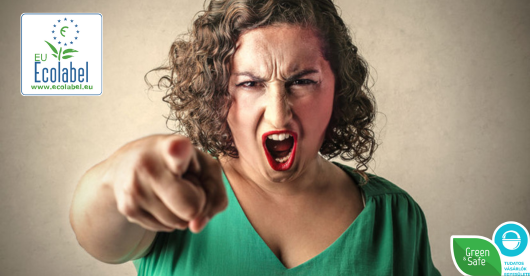
Success: fake green claims will be banned in the EU
As of 2026, the EU will better protect consumers against greenwashing. European legislators have agreed on a directive aimed at an enhanced protection of consumers and the strengthening of consumer rights. Here’s a list of what the new law will bring to customers. Which unfair business practices will be banned.
I’m standing in DM in front of the shelf. I came here to get shampoo. I have five minutes to make my choice before the running-around-all-day goes on. I am a conscious consumer, I am preoccupied by the state of the environment, and I hate being scammed. I want clean hair, but I also want that dragonflies don’t die in our waters. I am so determined. I scan the shelves like a hunting dog and I know roughly what I’m looking for: EU-Ecolabel, recycled plastic, No silicone. But I just don’t see any shampoo with all these three! What I see instead is everything else – after a few minutes, I get lost, drowning in the sea of green claims, until I end up picking something off the shelf pretty much at random. My time is up.
We consumers have a decisive role in making truly green products and solutions common, but it is just so terribly hard to make the right choice. Good news is that according to an EU decision, I will soon have more information to make a sustainable decision when I buy cleaning products, food, new clothes or household appliances.
Fortunately, the new rules bring order to the chaos of green claims! Under the Empowering Consumers for the Green Transition directive, companies must explain why they claim their products are environmentally friendly.
The new rules could make durable products more competitive on the market and encourage consumers to invest in quality over quantity.
What will be banned?
- Making generic environmental claims such as environmentally friendly, natural, biodegradable, climate neutral, carbon neutral, eco, for which the trader is unable to demonstrate an excellent environmental performance.
- Displaying a sustainability label that is not based on certification schemes or established by public authorities.
- Stricter rules for future environmental performance claims – these will only be allowed if they include a realistic implementation plan and achievable targets and if they are regularly reviewed by independent third-party experts whose findings shall be made available to consumers.
- “Carbon neutral” claims, which are highly misleading to consumers, and are everywhere on the market, often in the most environmentally-harmful sectors, such as aviation and food.
- False claims about the repairability of a product.
- Saying a software update is essential when it isn’t.
- New harmonised guarantee label to inform consumers on durability, which may influence their purchasing decisions.
- The practice of planned obsolescence.
Are you looking for real green products? Check products with the EU-Ecolabel here or in our free mobile application!
“The new EU rules will enable consumers to navigate through a sea of green claims and choose durable products that live up to expectations.”
– BEUC Deputy Director General Ursula Pachl commented.
Carbon neutrality is a lie
Banning carbon neutral claims is great news for consumers. Because there is no such thing as “carbon-neutral” or “CO2-neutral” cheese, nor plastic bottles, airplane flights or bank accounts.
Claiming to be carbon neutral is always a sham: it gives customers the impression that companies are serious about their impact on the climate. The truth is that these claims are scientifically unfounded.
Next steps
These new rules, once formally adopted, will need to be implemented in EU countries by national governments and will take effect in 2026.
Kép forrása: 123RF

Green&Safe LIFE-styles project is supported by the LIFE programme of the European Union and co-financed by the Hungarian Ministry of Agriculture. Project number: ENV GIE


